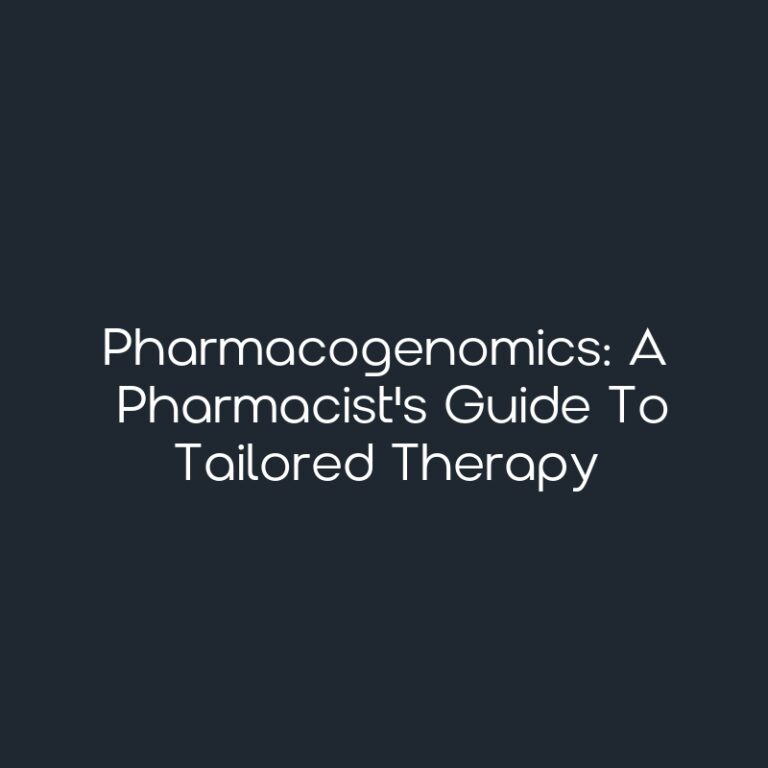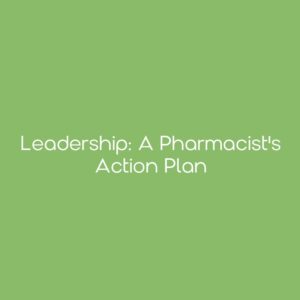Pharmacogenomics: A Pharmacist’s Guide to Tailored Therapy

Pharmacogenomics: A Pharmacist’s Guide to Tailored Therapy
Discover how personalized medicine can have an impact on patient outcomes with our comprehensive pharmacogenomics training course for pharmacists. Gain a better understanding of the intricate relationship between genetics and drug response, explore cutting-edge research, review how genetic variations affect drug metabolism, and discuss practical insights for implementing pharmacogenomics into pharmacy practice. Revolutionize your pharmacy career by mastering the science behind pharmacogenomics to provide individualized care and optimize patient outcomes.
The course includes 10 activities:
1. Applying Pharmacogenomics to Patient Care – Our Current State
2. Genetics 101
3. Regulatory Review – Impact on Pharmacogenomics
4. Gene Information
5. Application to Practice – Opioids
6. From Phenotype to Drug Selection
7. Case-Based Application of Pharmacogenomics
8. Choosing a Laboratory Partner
9. Explaining Pharmacogenomic Results to Healthcare Providers
10. Explaining Pharmacogenomic Results to Patients
Upon successful completion of this application-based CPE course, pharmacists should be able to:
1. Describe the pharmacists’ role in pharmacogenomics (PGx)
2. Discuss the state of PGx implementations across the industry
3. Recognize basic mechanisms for genetic variation to impact medications
4. Describe the standard nomenclature used in PGx
5. Compare and contrast different types of genetic tests
6. Provide specific examples that establish the relationship between altered drug disposition and genetic variants
7. Describe how PGx can be utilized to predict an individual’s response to drug therapy
8. Detail ethical, legal, and social issues (ELSI) and regulatory concerns surrounding PGx testing
9. Review regulatory activity, especially FDA guidance and rulemaking, impacting PGx
10. Describe the potential limitations of PGx testing
11. Describe the role of various PGX resources available to support clinical application
12. Discuss strategies to identify whether a drug-gene pair is ready for clinical use
13. Recognize the value that PGx can bring to patient care
14. Develop a pharmacotherapy regimen based on patient PGX results and characteristics
15. Create PGx therapeutic guidelines for selected drugs using a specified framework
16. Utilize clinical decision support tools to inform therapeutic recommendations
17. Apply guidelines and other evidence to patient cases across multiple medical specialties and subspecialities (e.g., behavioral health, cardiology, oncology, pain management)
18. Identify the impact of ancestry on PGx variant frequencies
19. Discuss the roles and responsibilities of clinical laboratories
20. Describe criteria for selecting a PGx laboratory
21. Compare and contrast provider-ordered clinical PGx lab testing vs direct-to-consumer genetic testing
22. Detail the key components required in a PGx test for clinical practice
23. Describe utilization of PGx in terms relevant for healthcare providers and payors
24. Identify strategies to develop and deliver PGx recommendations to prescribers
25. Explain genetic testing and its role in health care to patient
26. Describe important counseling points for PGx testing
This is not an ACPE-defined Certificate Program; learners who complete this course will receive ACPE CPE credit but will not be awarded completion of a Certificate Program.
Financial support was provided for this course through an unrestricted educational grant from RxGenomix, a comprehensive pharmacogenomics (PGx) solutions company dedicated to empowering healthcare providers to optimize and scale the application of PGx.
Faculty:
D. Max Smith, PharmD, BCPS
Clinical Pharmacogenomics Specialist
MedStar Health
Emily Loudermilk, PharmD, MS Pharmacogenomics, BCPS
Operational/Clinical Pharmacist
OhioHealth
Jake Galdo, PharmD, MBA, BCPS, BCGP
Course Content and Developer, CEimpact
Managing Network Facilitator, CPESN Health Equity
CEO, Seguridad
Behnaz Sarrami, MS, PharmD, PGx Certification
Director of Consulting
Missouri Pharmacogenomics Consulting LLC
Sarah Mills, PharmD, BCPS
Clinical Pharmacy Practitioner, Pharmacogenomics
Durham Veterans Affairs Health Care System
D. Max Smith, Emily Loudermilk, and Sarah Mills have no relevant financial relationships with ineligible companies to disclose.
Jake Galdo reports that his wife is employed by Eli Lilly and is a former employee of Prime Therapeutics. He is CEO of Seguridad, Inc. and Managing Network Facilitator of CPESN Health Equity. All relevant financial relationships have been mitigated.
Behnaz Sarrami is a Consultant for Missouri Pharmacogenomics Consulting, LLC. All relevant financial relationships have been mitigated.
Fee includes course, course materials, and CPE credit submission to CPE Monitor.
Course is non-refundable.
Initial Release Date: December 15, 2023
Planned Expiration Date: December 15, 2026
Copyright 2023, CEimpact. All Rights Reserved. Any reproduction of this course without express permission is strictly forbidden.
![]() CEImpact is accredited by the Accreditation Council for Pharmacy Education as a provider of continuing pharmacy education. Obtain CPE credit by completing the course, followed by the exam and evaluation (if applicable). Once successfully completed, your course will appear in your Completed Courses tab. Access your CPE statement of credit at www.MyCPEMonitor.net.
CEImpact is accredited by the Accreditation Council for Pharmacy Education as a provider of continuing pharmacy education. Obtain CPE credit by completing the course, followed by the exam and evaluation (if applicable). Once successfully completed, your course will appear in your Completed Courses tab. Access your CPE statement of credit at www.MyCPEMonitor.net.
¹CEImpact provides you with two (2) opportunities to complete the exam. The learner will not receive CPE credit after two failed attempts.
Additional information
| Duration | 8h 0m |
|---|---|
| Topic Designator | Operations |
| ACPE | Yes |
| ACPE Topic | 01 Drug Therapy |
| Role | Pharmacist |
| Media-Type | On-Demand |
| Release Date | 12/15/23 |
| CEUs | 0.8 |
| Rating | 4 |
| ACPE Number | 0107-0000-23-343-H01-P |

![An Introduction to Functional Medicine [Pharmacist]](https://www.ceimpact.com/wp-content/uploads/course-images-solidbg/2023/01/pharmacist/5480-300x300.jpg)


